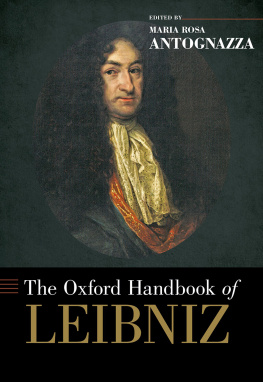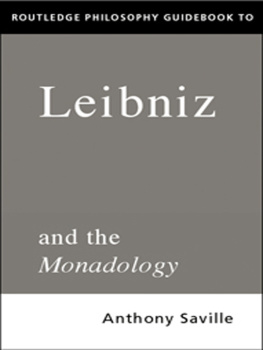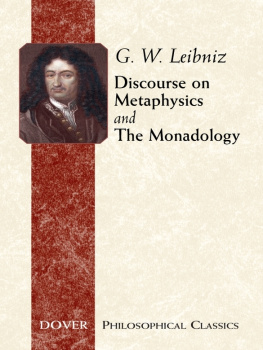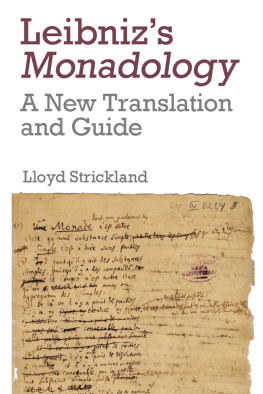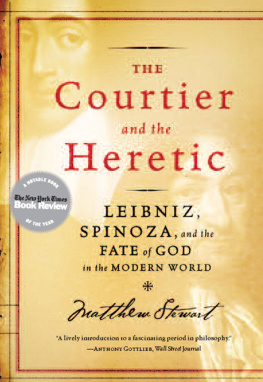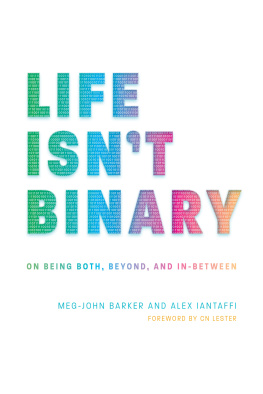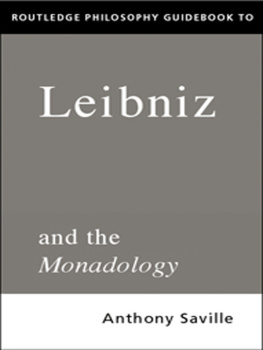Contents
Guide
Pagebreaks of the print version
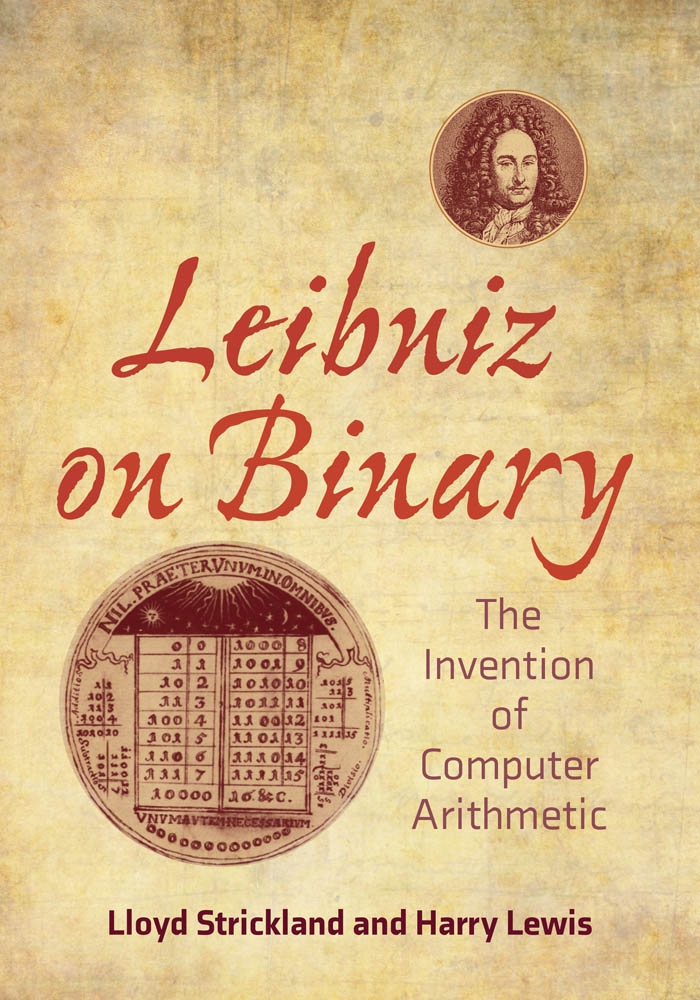
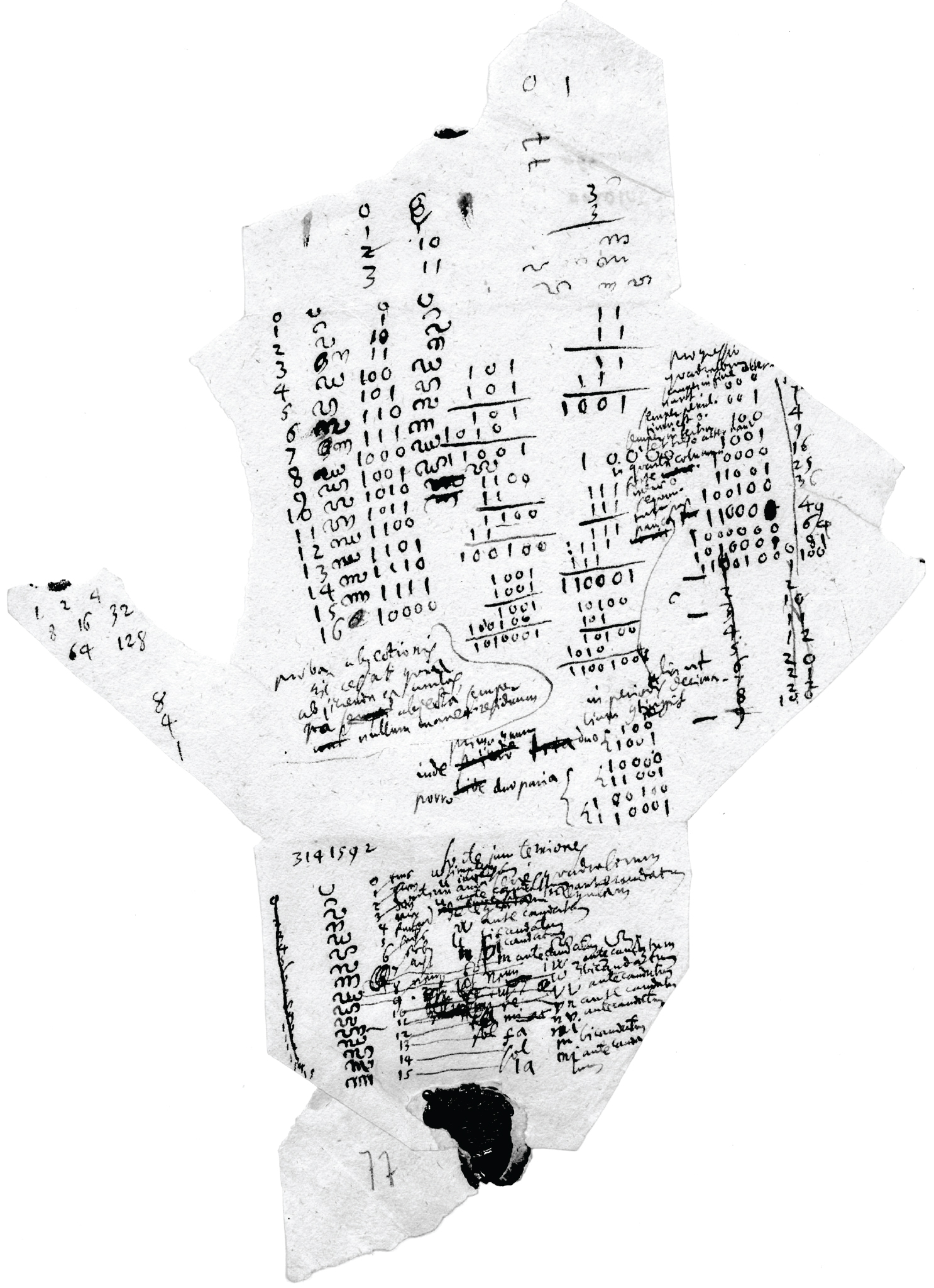
Manuscript of Sedecimal on an Envelope (LH 35, 3 B 5 Bl. 77).
Leibniz on Binary
The Invention of Computer Arithmetic
Lloyd Strickland and Harry Lewis
The MIT Press
Cambridge, Massachusetts
London, England
2022 Lloyd Strickland and Harry R. Lewis. All scanned images are of manuscripts held by and reproduced with permission of the Gottfried Wilhelm Leibniz Bibliothek Niederschsische Landesbibliothek, Hanover.
All rights reserved. No part of this book may be reproduced in any form by any electronic or mechanical means (including photocopying, recording, or information storage and retrieval) without permission in writing from the publisher.
Library of Congress Cataloging-in-Publication Data
Names: Leibniz, Gottfried Wilhelm, Freiherr von, 16461716, author. | Strickland, Lloyd, 1973 editor, translator, writer of added commentary. | Lewis, Harry R., editor, translator, writer of added commentary.
Title: Leibniz on binary : the invention of computer arithmetic / Lloyd Strickland and Harry Lewis.
Description: Cambridge, Massachusetts : The MIT Press, [2022] | Includes bibliographical references and index.
Identifiers: LCCN 2021059164 | ISBN 9780262544344 (paperback)
Subjects: LCSH: Leibniz, Gottfried Wilhelm, Freiherr von, 16461716Translations into English | Binary system (Mathematics) | Mathematics, German. | Binary system (Mathematics)HistorySources.
Classification: LCC QA141.4 .L45 2022 | DDC 513.5/2dc23/eng20220405
LC record available at https://lccn.loc.gov/2021059164
d_r0
This book is dedicated
by Lloyd to Vernon Pratt, mentor, friend, and vir eximie, as Leibniz would say.
As an indefatigable source of wisdom, inspiration,
and knowledge of where to find good desserts,
you are too good for this world.
by Harry to the memory of his father, Emil Harold Lewis,
who with the 16th General Hospital, from 1943 to 1945,
helped save his fathers birthland, free his grandfathers,
and create the enduring Anglo-German-American friendship
of which this book is fruit.
Medio tutissimus ibis.
All programmers are optimists.
Frederick P. Brooks Jr., The Mythical Man-Month
Contents
List of Figures
Abbreviations
A | Leibniz (1923). Cited by series, volume, and page or item number (N). |
|---|
DSR | Leibniz (1992). |
Dutens | Leibniz (1768). |
GM | Leibniz (18491863). Reprinted as Leibniz (1977). |
Gotha | Manuscript held by Forschungsbibliothek Gotha, Erfurt, Germany. |
GP | Leibniz (18751890). |
LBr | Manuscript held by Gottfried Wilhelm Leibniz Bibliothek, Niederschsische Landesbibliothek, Hanover, Germany. Cited by shelfmark and Blatt [sheet]. |
LGR | Leibniz (2016a). |
LH | Manuscript held by Gottfried Wilhelm Leibniz Bibliothek, Niederschsische Landesbibliothek, Hanover, Germany. Cited by shelfmark and Blatt [sheet]. |
LTS | Leibniz (2011b). |
PPL | Leibniz (1969). |
SLT | Leibniz (2006b). |
W | Leibniz (2006a). |
WOC | Leibniz (1994). |
Z | Zacher (1973). |
Preface
It would be pointless to say that Mr. Leibniz was a mathematician of the first rank, [since] it is through mathematics that he is most generally known.
Bernard le Bovier de Fontenelle (1718, 108109)
Despite his original contributions to a host of disciplines, such as law, philosophy, politics, languages, and many areas of science, the fame and renown of the polymath Gottfried Wilhelm Leibniz (16461716) has always rested principally on his pioneering mathematical work, in particular his independent invention of the calculus in 1675. Another of his enduring mathematical contributions was his invention of binary arithmetic, though the utility of binary went unrecognized until it became the basis for todays world of digital computing and communications. And in a second flash of foresight, Leibniz also invented the other number system commonly used in computing, namely, base 16, or hexadecimal in modern parlance (Leibnizs own term for it was sedecimal). These two inventions are the focus of this book.
Leibnizs groundbreaking work in mathematics is all the more remarkable given that he did not begin serious study of the subject until he was in his mid-twenties. Born in Leipzig in 1646 to a professor of moral philosophy, Leibniz obtained his bachelors and masters degrees in philosophy in 1663 and 1664, respectively, before turning to the law, in which he obtained a bachelors degree in 1665 and a doctorate a year later. By the end of the 1660s, he was at the court of Mainz working alongside the diplomat Johann Christian von Boineburg (16221672) on reforming the legal code. In February 1672, Boineburg dispatched him on a diplomatic mission to Paris, where he met some of the foremost mathematicians of the day, most notably Christiaan Huygens (16291695). Leibniz later recalled that he had arrived in Paris with a superb ignorance of mathematics (GM III, 71), but this was soon rectified by Huygenss tutelage and his own insatiable thirst for inquiry. He initially focused on summing infinite series and the classical Greek problem of squaring the circle, and from his intensive work on both, he eventually arrived at the calculus. In October 1675, he devised the symbols d and , which are still used today.
Despite his growing reputation as a mathematician, Leibniz was unable to secure a post in Paris. One year after his breakthrough with the calculus, and a little over four and a half years since his arrival in Paris, Leibniz departed for the northern German city of Hanover to take up the post of court counselor, a role he held for the remaining forty years of his life (though in the intervening years, his facility at moving within courtly circles enabled him to add roles in Wolfenbttel, Berlin, and Vienna to his portfolio). Leibniz later explained that he stayed in Paris as long as he did in order to stand out a little bit in mathematics (A II 1, 753).
It was during his Paris years that Leibniz developed his lifelong interest in the automation of calculation. In the 1640s Blaise Pascal (16231662) had invented a machine capable of adding and subtracting, but Leibniz wanted to go further, proposing a machine capable of multiplying, dividing, and even (in his initial plans, in 1670, for a new arithmetic instrument) extracting roots (LH 42, 5 Bl. 16v). His designs were refined over the next three years, but putting into practice his belief that wheels and cranks could perform the labors of the mind proved a challenge. A machine he demonstrated at the Royal Society in London in 1673 was, by all accounts, imperfect. one of which is displayed at the G. W. Leibniz Bibliothek in Hanover.



